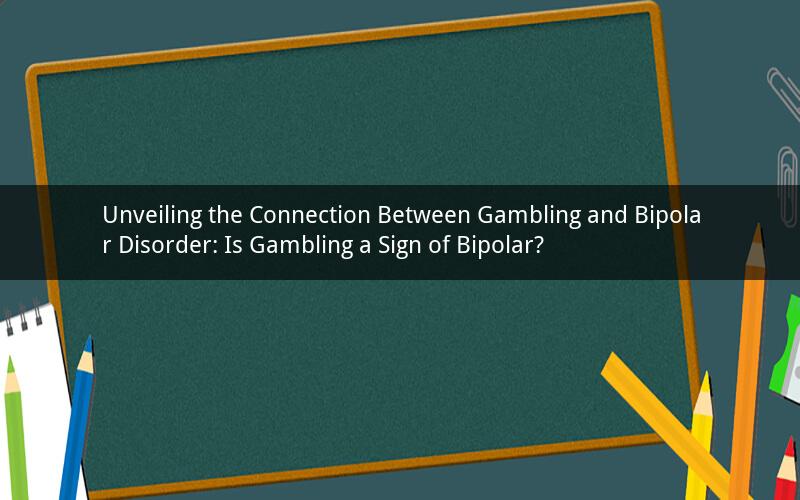
Gambling, an activity involving risking money or possessions on an event with an uncertain outcome, has been a subject of debate for decades. One question that often arises is whether gambling is a sign of bipolar disorder. This article delves into the intricate relationship between these two phenomena, exploring the evidence, myths, and misconceptions surrounding this issue.
Understanding Bipolar Disorder
Bipolar disorder, also known as manic-depressive illness, is a chronic mental health condition characterized by extreme mood swings. Individuals with bipolar disorder experience episodes of elevated mood, known as mania or hypomania, and periods of depression. These mood swings can significantly impact their daily functioning, relationships, and overall well-being.
The Link Between Gambling and Bipolar Disorder
Research indicates that there is a link between gambling and bipolar disorder. Studies have shown that individuals with bipolar disorder are more prone to developing gambling problems than the general population. This association can be attributed to several factors:
1. Shared Neurochemical Imbalances: Both bipolar disorder and gambling share common neurochemical imbalances, particularly in the brain's reward and pleasure pathways. This may explain why individuals with bipolar disorder are more susceptible to the addictive nature of gambling.
2. Mood Swings: The mood swings associated with bipolar disorder can lead individuals to seek excitement and risk-taking behaviors, such as gambling, to alleviate their emotional distress.
3. Impulse Control Issues: Bipolar disorder is often accompanied by impulsivity, which can make individuals more likely to engage in risky behaviors, including gambling.
4. Co-Occurring Disorders: Many individuals with bipolar disorder also suffer from other mental health conditions, such as substance abuse or personality disorders, which can further contribute to gambling problems.
Evidence Supporting the Link
Several studies have provided evidence supporting the connection between gambling and bipolar disorder. One study published in the Journal of Affective Disorders found that individuals with bipolar disorder were more likely to have a history of gambling problems than those without the disorder. Another study, published in the American Journal of Psychiatry, reported that approximately 10% of individuals with bipolar disorder also had a gambling disorder.
Myths and Misconceptions
Despite the evidence, several myths and misconceptions still surround the link between gambling and bipolar disorder. Some of these include:
1. Gambling is a symptom of bipolar disorder: While gambling can be a sign of bipolar disorder, it is not a defining symptom. Many individuals with bipolar disorder do not engage in gambling.
2. All individuals with bipolar disorder are prone to gambling: While the risk is higher, not all individuals with bipolar disorder will develop gambling problems.
3. Treatment for bipolar disorder can cure gambling problems: While treating bipolar disorder can help manage the underlying causes of gambling problems, it may not completely cure the addiction.
5 Questions and Answers
1. Question: Can someone with bipolar disorder recover from gambling addiction?
Answer: Yes, recovery from gambling addiction is possible for individuals with bipolar disorder. Treatment often involves a combination of medication, therapy, and support groups.
2. Question: Does gambling always lead to bipolar disorder?
Answer: No, gambling does not always lead to bipolar disorder. However, the two conditions share common risk factors and may co-occur in some individuals.
3. Question: Is there a specific type of gambling that is more common in individuals with bipolar disorder?
Answer: There is no specific type of gambling that is more common in individuals with bipolar disorder. However, they may be more susceptible to all forms of gambling.
4. Question: Can medication prescribed for bipolar disorder affect gambling behavior?
Answer: Yes, medication prescribed for bipolar disorder can affect gambling behavior. Some medications may reduce impulsivity and improve mood, potentially reducing the urge to gamble.
5. Question: Should individuals with bipolar disorder avoid gambling altogether?
Answer: It is essential for individuals with bipolar disorder to be cautious about gambling. They may consider seeking support and therapy to develop healthy coping mechanisms and avoid risky behaviors.
In conclusion, there is a clear link between gambling and bipolar disorder, with evidence supporting the idea that individuals with bipolar disorder are more susceptible to gambling problems. Understanding the underlying factors and myths surrounding this relationship is crucial for effective treatment and prevention strategies. While gambling may not always be a definitive sign of bipolar disorder, individuals with the condition should remain vigilant and seek support when necessary.